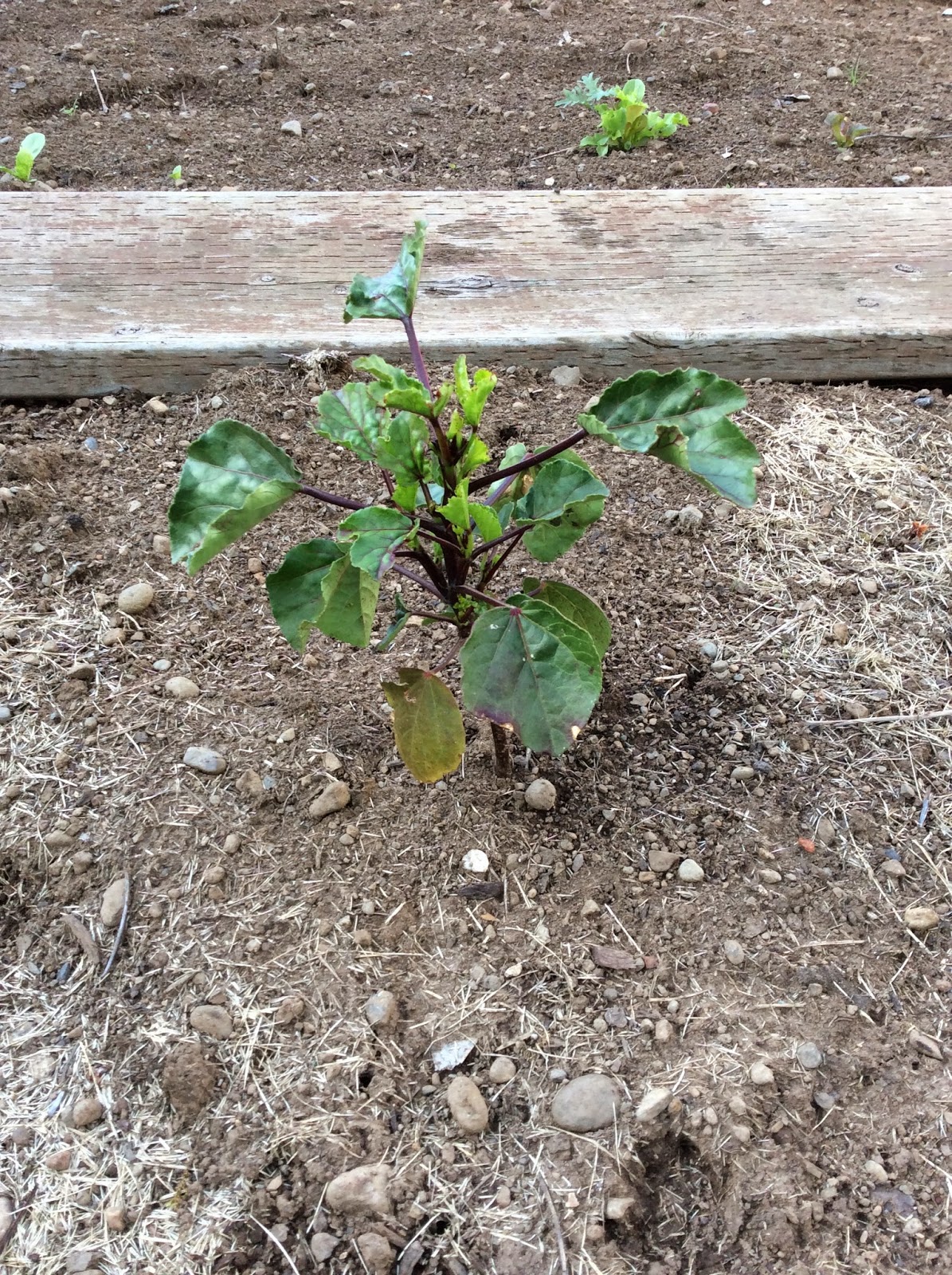I tend to over do things (surprise, surprise) in the veggie garden and I end up growing too much and having to spend a lot of time delivering (pawning off) extra produce to family, coworkers and neighbors. It's usually not a problem with the tomatoes though, everybody fights over those!
It took a few years of farming in Lents to discover that I don't really need 15 tomato plants, 3 rows of beans or a ginormous clump of horseradish.
But this year, I was in a veggie slump. I perused my seed catalogs, but nothing spoke to me.
At least I knew that I wasn't growing entire rows of things from seed. No more aphid attracting Brussels sprouts and nine tomatoes max (it's so hard to give up my favorites).
I was going to buy single pots or 6-packs of veggies already growing.
Then an opportunity presented itself to help a fellow gardener with a project testing Haitian vegetables and how well they grow/produce in Oregon.
This gave me the inspiration I needed to try something new.
 |
| My Haitian Veggie Start Booty |
 |
Pigeon Pea, Congo Pea (Cajanus cajan) - A woody, leguminous shrub or small tree. It can grow up to 5-7 feet! A member of the fabaceae family, highly drought tolerant, perennial up to 5 years where there is no frost. One of the most consumed beans in the world. Elegant leaves make for an attractive hedge and garden wind breaker where pigeon peas grow well. Peas are edible green as well as dried. Full sun. Plant after danger of frost has passed; can be grown in large pot to bring indoors during winter. Its roots grow deep to seek out water, and it is a nitrogen fixer like other members of the bean family. Beautiful yellow/red and yellow flowers 10-15 weeks after germination; pods begin to form at 15-20 weeks. Harvest green or leave on plant to dry; can be removed to dry in sheltered area if rains start.
 |
| Pigeon Pea (Cajanus cajan) in the center, Gazanias too. |
Okra Jing Orange - 60 days. Lovely pods are a deep reddish orange and are quite colorful. This Asian variety produces lots of flavorful 6" pods early, even in dry conditions.
Okra Cow Horn - 55 days. A heavy yielder of 8 to 14" pods on plants that may reach 7-8 feet tall. Although the large pods remain spineless and tender up to 10", the best quality pods are picked when 5 to 6" long. This is a heavy producer with many side branches, and it can be depended upon to make a superb crop. An impressive plant.
 |
| Jing Orange (Left and Center) and Cow Horn (Right) |
Peanut Tennessee Red Valencia - 110 days. Earliest maturing. 2-5 seeds per pod.
Tomato Olirose de St. Domanique - 75 days, pink oval fruit, plum-like skin, excellent sweet flavour.
 |
| Cute tomato starts! |
 |
| The closest two plants are Plate de Haiti and Olirose de St. Domanique |
Roselle (Hibiscus sabdariffa) - The hibiscus in red zinger tea and popular drinks called "Bissap" or "agua de Flor de Jamaica". The leaves of the plant can be eaten also.
 |
| Roselle #1 |
 |
| Roselle #2 |
Scotch Bonnet Pepper (Capsicum chinense, yellow) - 95 days. Aka Jamaican Scotch Bonnet Pepper, a more fruity flavored hot pepper, related to habenero. An iconic pepper in Haitian cuisine that imparts a signature flavor and is used judiciously. It's not meant to create burning hot dishes but to enhance spice.
 |
| Three Scotch Bonnets is a lot of hot peppers! |
 |
| Sorghum Rox Orange - Then |
 |
| Now - They are growing like gangbusters! |
While I'm not 100% sure what I will do with sorghum, it seems like a fun thing to try! I'll be happy to share in the fall!


This is so cool! I can't wait to see how everything does. Peanuts, hibiscus and Calabash, oh my!
ReplyDeleteI am keeping track of everything and then will be reporting my experience (success/failure) in the fall. I have a good feeling about it though!
DeleteMy neighbor has cane growing. I asked if he planned to make syrup? His son and son in law will probably take it and have it ground for the juice, he said. I know people who chew cane (syrup cane and sorghum, too). I think it is an acquired taste. If you can find someone who cooks off cane, sorghum makes tasty gingerbread.
ReplyDeleteSorghum is worth growing just for the tropical effects.
It is just fun knowing that I am growing such an Old World plant. I will see how it does and then how it tastes (for chewing). I have never heard of anybody cooking off cane to make syrup. Seems like a lot of work/mess for something I can buy cheaply, but it might be an interesting experience just once. Hopefully I can find someone in my neighborhood that would like to use it, otherwise it will be Halloween decorations!
DeleteWhat a fun challenge - in the garden as well as the kitchen! Earlier this spring I saw a rack of seeds at Uwajimaya sporting lots of veggie seeds for (to me) more unusual vegetables used in Asian cuisine. I was so intrigued, and wished I had more room to be creative!
ReplyDelete